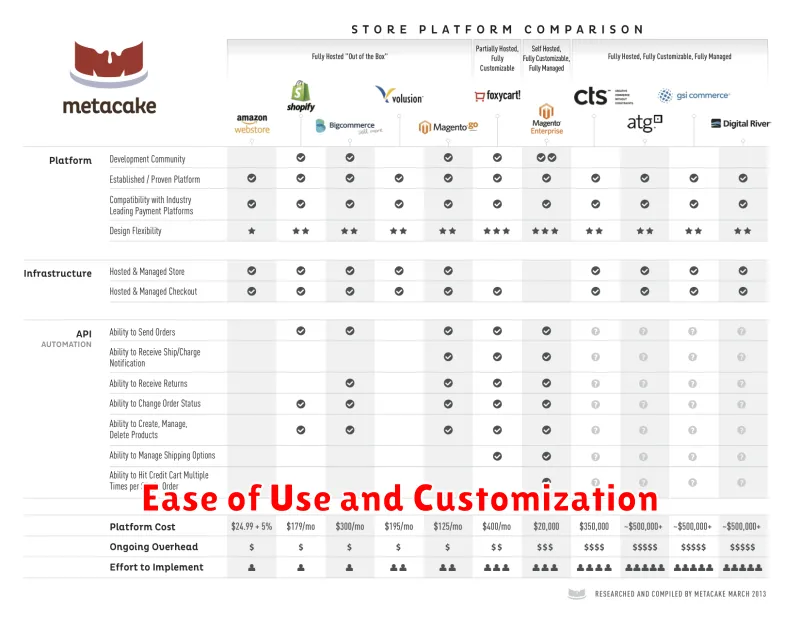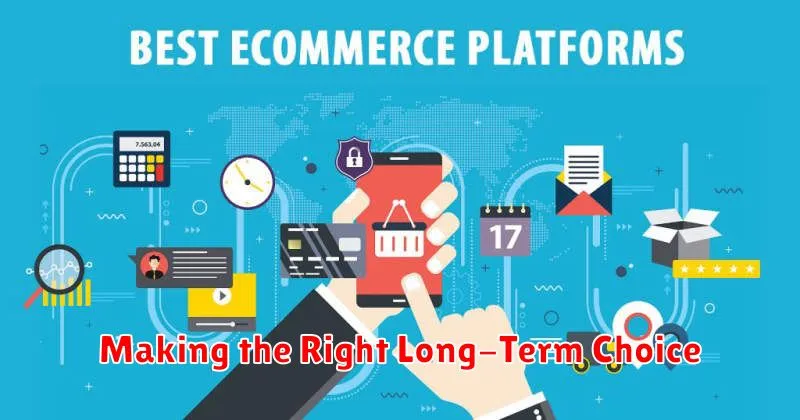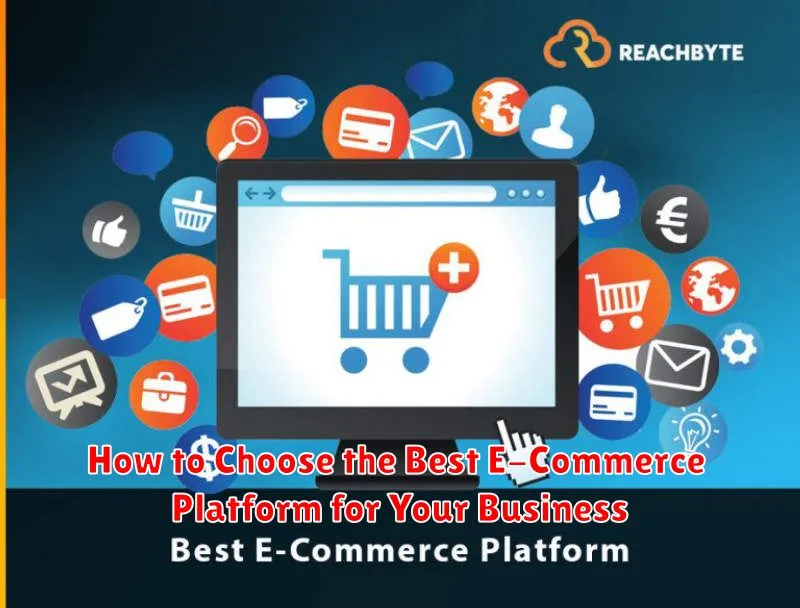Launching a successful online store hinges on selecting the right e-commerce platform. With so many options available, making the best choice can feel overwhelming. This comprehensive guide will illuminate the crucial factors to consider when choosing an e-commerce platform for your business, ensuring a seamless transition into the digital marketplace. Whether you’re a small startup or an established enterprise, understanding your specific needs is paramount to selecting the best e-commerce platform to support your growth and achieve your business objectives.
From scalability and pricing to features and security, we will delve into the key aspects that differentiate each platform. By the end of this article, you will be equipped with the knowledge to confidently choose the best e-commerce platform for your unique business needs, setting you on the path to online success. Discover how to evaluate e-commerce platforms based on your budget, technical expertise, and long-term goals. Learn how to choose between hosted solutions, open-source platforms, and enterprise-grade options to find the perfect fit for your business.
Key Features to Look For
Choosing the right e-commerce platform hinges on identifying key features aligned with your business needs. Scalability is crucial for future growth, ensuring the platform can handle increasing traffic and sales. Consider the platform’s pricing structure, including transaction fees and monthly costs.
Ease of use is essential for managing your online store efficiently. Look for intuitive interfaces for product management, order fulfillment, and customer service. SEO features are vital for driving organic traffic. Ensure the platform offers tools for optimizing product descriptions, meta tags, and URLs. Mobile responsiveness is non-negotiable in today’s market. Your platform must offer a seamless experience on all devices.
Comparing Shopify, WooCommerce, Wix, and More
Choosing the right e-commerce platform depends on your specific business needs and technical skills. This section provides a concise comparison of popular options, highlighting key features to consider.
Shopify is a fully hosted, user-friendly platform ideal for beginners. It offers a range of pricing plans and requires no technical expertise. WooCommerce, a WordPress plugin, provides greater flexibility and customization but demands more technical involvement. Wix, like Shopify, is a hosted solution catering to users seeking simplicity, though it offers fewer advanced e-commerce features. Other platforms like BigCommerce and Squarespace provide varying degrees of control and ease of use.
| Platform | Ease of Use | Customization | Cost |
|---|---|---|---|
| Shopify | High | Medium | Monthly Subscription |
| WooCommerce | Medium | High | Free (Hosting & other costs apply) |
| Wix | High | Low | Monthly Subscription |
Pricing and Transaction Fees
E-commerce platform pricing varies significantly. Some platforms offer free plans with limited features, while others charge a monthly or annual subscription fee. Transaction fees are another important consideration. Most platforms charge a percentage of each sale, which can impact your profit margins.
When evaluating pricing, consider the platform’s features, transaction fees, and your projected sales volume. A more expensive platform may be worthwhile if it offers features that help you increase sales and efficiency.
Ease of Use and Customization

Ease of use is a critical factor, especially if you’re new to e-commerce. Look for a platform with an intuitive interface, drag-and-drop functionality, and easy-to-understand menus. A user-friendly platform will save you valuable time and resources.
Customization options determine how much control you have over your online store’s appearance and functionality. Some platforms offer basic templates with limited customization, while others provide extensive design flexibility and coding options. Consider your technical skills and the level of control you require. Do you need a simple, out-of-the-box solution, or do you prefer a highly customizable platform that can adapt to your unique branding and business needs?
Integration With Payment Gateways
A crucial aspect of any e-commerce platform is its ability to seamlessly integrate with payment gateways. Secure and reliable payment processing is essential for a positive customer experience and successful online sales.
When evaluating platforms, consider which payment gateways are supported. Look for platforms that offer integration with popular gateways like Stripe, PayPal, and Square. Also, consider the transaction fees associated with each gateway and how those fees align with your budget.
Flexibility is also important. Your business needs may evolve, so choose a platform that allows you to easily add or switch payment gateways as needed. Some platforms offer a wider range of integrations than others, providing more options for future growth.
Mobile Responsiveness
In today’s mobile-first world, mobile responsiveness is no longer a luxury but a necessity for e-commerce success. A mobile-responsive design ensures your online store adapts seamlessly to different screen sizes, providing a consistent and user-friendly experience on smartphones, tablets, and desktops.
When evaluating e-commerce platforms, prioritize those that offer responsive themes and built-in mobile optimization features. This will significantly impact user engagement, conversion rates, and ultimately, your bottom line.
SEO and Marketing Tools
Search engine optimization (SEO) and marketing tools are crucial for driving traffic and sales to your online store. Consider platforms that offer integrated features or seamless integrations with third-party tools.
Key features to look for include:
- SEO-friendly URLs
- Meta description customization
- Blogging capabilities
- Email marketing integrations
- Social media marketing integrations
Evaluate the robustness of these features and whether they meet your specific marketing needs. A platform with strong SEO and marketing capabilities can significantly impact your online success.
Inventory and Shipping Options
Inventory management is a crucial aspect of e-commerce. Some platforms offer built-in inventory tracking, while others integrate with third-party software. Consider whether you need features like real-time inventory updates, low-stock alerts, and automated purchase orders.
Shipping is another key consideration. Look for platforms that offer flexible shipping options, such as integrating with multiple carriers, offering real-time shipping rates, and allowing for customized shipping rules based on weight, location, or order value. Efficiently managing shipping costs can significantly impact your bottom line.
Support and Security Features
Robust support and security are crucial for any e-commerce platform. Consider the availability of technical support, whether it’s 24/7 or limited hours. Look into the methods of support offered, such as phone, email, or live chat.
Security features are paramount for protecting sensitive customer data and your business. Ensure the platform offers SSL encryption, fraud detection, and complies with PCI DSS standards. These features help safeguard transactions and maintain customer trust.
Making the Right Long-Term Choice

Selecting an e-commerce platform is a long-term investment. Prioritize scalability to accommodate future growth. A platform that suits your current needs might not be ideal as your business expands.
Consider total cost of ownership. Beyond initial setup fees, factor in transaction fees, hosting costs, and potential development expenses. Some platforms offer lower upfront costs but higher ongoing fees.
Evaluate the platform’s integration capabilities. Seamless integration with existing business tools, like CRM and marketing automation software, is crucial for efficiency and data consistency.

